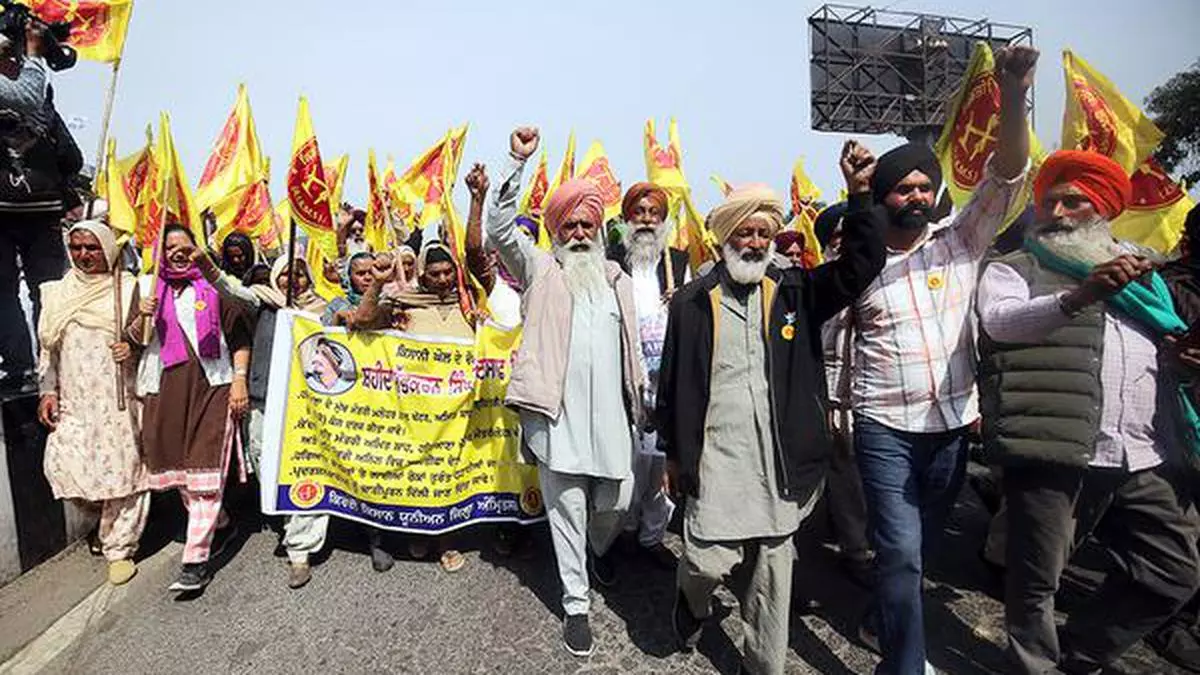SKM, main faction of 2020-21 farmer protest, holds Mahapanchayat in Delhi’s historic Ramlila Maidan
Allowed by the Centre, the Samyukta Kisan Morcha (SKM) on Thursday held a protest in Delhi’s Ramlila Maidan, which is witness to many historic movements of independent India, including the Anna Hazare-led protest against the UPA government. But the Delhi Police, under the direct control of the Centre, on March 12 denied permission to another faction of SKM to hold a protest at Jantar Mantar, citing traffic and law and order issues.
Farmers in large numbers started gathering early in the morning after reaching by trains on overnight journeys from distant places. Named a “Kisan Mazdoor Mahapanchayat”, the protest is being organised by different organisations, including the Bharatiya Kisan Union (BKU) led by the Tikait brothers as well as several farmer and worker outfits affiliated with Left parties. Also, influential farmer unions of Punjab and Haryana are also participating in the day-long protest.
The SKM was formed as an umbrella body of several farmer organisations to lead the protest against the controversial three farm laws, which were repealed after one year of protest. A resolution is likely to be passed at the “Kisan Mazdoor Mahapanchayat” to intensify the fight against the Centre’s policies. Farmers were seen raising slogans against the Centre at the venue.
It was clear that all the farmers were aware of the key demand—a legal guarantee for MSP. Manjit Singh, a farmer from Punjab’s Ludhiana district who arrived on Wednesday night, said that farmers failed to understand why the government was not accepting the demand, which would not have any financial implications, as traders would be asked to pay at least the MSP.
However, farmers who have reached for the protest are also very articulate and speak on the line to which their affiliated organisation takes the stand for any issue. For instance, a group of farmers demanded that a murder case be filed against the union minister of state for home, Ajay Mishra, alias Teni, for the Lakhimpur Kheri incident of October 2021. Mishra’s son, currently on bail, is facing the case for allegedly causing death to some farmers by his jeep.
The organisers have made arrangements for the farmers’ stay at different Gurudwaras. In view of the farmers’ gathering, the Delhi Police have issued a traffic advisory for commuters to avoid the roads leading to central Delhi. The Delhi Police are said to have permitted the farmers to hold the event on the condition that there will not be a gathering of more than 5,000 people.
On the other hand, the SKM (non-political) and Kisan Mazdoor Morcha (KMM) are stuck on the Punjab-Haryana border at two points as Haryana Police has prevented them from using the highways in its territory to reach Delhi via tractors. “It is a clear intention of the government to divide the farmer organisations by allowing one group and not allowing the other,” said a farmer leader of KMM.
“We understand the government’s design and will not blame the SKM for securing the permission. However, the main difference between the two groups on the issue of participation in electoral politics has yet to be reconciled. The SKM (non-political) and KMM on Wednesday announced a detailed plan of action starting from March 15.
Apart from a legal guarantee of MSP, farmers have been demanding the implementation of the Swaminathan Commission’s recommendation for fixing MSPs at 50 per cent over and above C2 (comprehensive) costs of production (including imputed costs of own land), unconditional pension for farmers above 60 years of age, and complete debt waiver of farm loan.
Later in the evening, SKM issued a statement saying its National Coordination Committee has decided to observe March 23 as ‘Save Democracy Day’ from “the threat of money and muscle power” in all villages across the country to protest the BJP nominating Teni from the Kheri Lok Sabha seat again. It also floated another banner- the United People’s Movement (UPM)- and appealed for mass protests against BJP across the country. The format of protest under UPM will be decided at the State level in consultation with the various organisations, it said.
